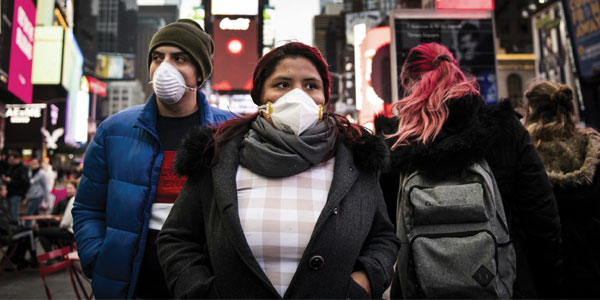
By Jorge Ramos
WHEN IT COMES TO DEATH, MEXICANS HAVE DEEPLY INGRAINED TRADITIONS.
MIAMI, Florida — Making burial arrangements for Basilio Juárez Pinzón in the Mexican city of Cuautla won’t be easy. It will be expensive, complicated and painfully bureaucratic, mainly because his ashes will have to be transported from New York City in the middle of a pandemic.
It took Félix Pinzón, Basilio’s brother, one month and four days to make arrangements for the cremation of the body on May 4. Basilio had died from Covid-19 at the age of 45. Unfortunately, with funeral homes in New York City overwhelmed and with Félix Pinzón lacking a death certificate for his brother, he still hasn’t been able to repatriate Basilio’s ashes to Mexico.
Over 1,000 Mexicans have died from Covid-19 in the United States, and many of them did not want to be buried in America. Most had an unspoken agreement with their families and friends: If I die in the United States, take me back to Mexico.
“Why wouldn’t Basilio consider a burial in New York, where he worked for so many years?” I asked Mr. Pinzón recently.
“No,” he responded. “I’m sure Basilio would have wanted to go back home to his family.” His wife and children live in Mexico. “It’s obvious to all of us Mexicans; we don’t want to be laid to rest far away from our homeland. Most of our families are in Mexico.”
This long-held tradition is beautifully expressed in an old song sung by the famed Mexican singer and actor Jorge Negrete: “México lindo y querido. Si muero lejos de ti, que digan que estoy dormido y que me traigan aquí.” (“Mexico, my beautiful and beloved country. Should I die abroad, away from you, tell everyone I’m asleep and bring me back to this land.”)
New York and the suburbs of New York City have recorded more Mexican deaths from Covid-19 than any other single state. The sad, lengthy and fairly complex task of repatriating the bodies of New York’s deceased Mexican immigrants has fallen to the local Mexican Consulate. Of the 687 Mexicans who have died from Covid-19 in New York, applications to repatriate more than 500 of them have been submitted, a representative from the consulate told me.
It is easier and less expensive to repatriate ashes than bodies. But even with cremation, many Mexican immigrants still cannot afford to repatriate their loved ones. “We can help with up to 1,800 U.S. dollars per case,” Jorge Islas, the Mexican consul general in New York, told me in an interview. With the consulate still closed, his team is working remotely to issue emergency documents. “We have traditions that have been part of our life since Mesoamerican times. And when it comes to our dead, we have deeply ingrained cultural traditions, a huge part of which involves bringing them back to the place where they were born. People tell us: ‘I want to be able to go to a specific place to pray for him, to cry and bring him flowers every year. That’s what we do.’”
A couple of years ago the animated Pixar film “Coco” showed the world just how close and unusual the relationship between the Mexican people and death is. Our dead live on forever. We want to keep them close — so we can talk to them and pamper them — even if we can’t actually touch them. The Mexican relationship to the dead bears some resemblance to our relationship with our living loved ones amid the social distancing restrictions imposed during the pandemic. Although our family members are often nearby, we can’t hug them or hold them close.
“Our songs, proverbs, fiestas and popular beliefs show very clearly that death cannot frighten us,” wrote Octavio Paz in “The Labyrinth of Solitude,” one of the most insightful accounts of the Mexican worldview ever written. Paz said that “the Mexican is familiar with death, jokes about it, caresses it, sleeps with it, celebrates it; it is one of his favorite toys and his most steadfast love.” To the ancient Mexican “death was not the natural end of life but one phase of an infinite cycle.”
And so we must go back to Mexico, lest we disrupt that cycle. Mexicans are leaving the United States in huge numbers, dead or alive, pandemic or no pandemic.
Many Mexicans no longer consider the United States an attractive place to work, live and raise a family. Anti-immigrant sentiment surged in America in the aftermath of Sept. 11, and things have only gotten worse under President Trump. Between 2010 and 2018, just over one million undocumented Mexican immigrants left the United States voluntarily to return home, according to the Center for Migration Studies. A 2015 analysis from the Pew Research Center found that more Mexicans had left America for Mexico than had entered the United States between 2009 and 2014 — and that 61 percent of the one million Mexicans who had returned home during that time had done so to reunite with their families.
Family is a big pull, a constant tug on our hearts. And that longing only ends with our deaths.
No one dreams about becoming an immigrant, about being forced to flee your country of birth because of economic desperation or political oppression. No wonder so many Mexicans want to return home after they die.
Nothing is more personal than deciding where you want to be buried. On the day of Basilio Juárez Pinzón’s cremation, four people, including a priest, took part in a small ceremony next to his coffin in New York. Félix Pinzón hasn’t been able to send his brother’s ashes home to Mexico, but he’s going to keep trying until it happens.
“It’s normal for any Mexican to want to go back to our homeland and be buried there,” he told me.
Although Basilio hadn’t talked about it, it was always clear to his brother that his loyalty to his country was as powerful as that expressed by Negrete in that old song: México lindo y querido, si muero lejos de ti …
_______________________________________________________________________
México lindo y querido, si muero lejos de ti
MÁS DE MIL MEXICANOS HAN MUERTO EN ESTADOS UNIDOS POR LA COVID-19. ESTA ES LA HISTORIA DE UN INMIGRANTE QUE QUIERE ENVIAR LAS CENIZAS DE SU HERMANO DE VUELTA A SU TIERRA.
MIAMI, Florida — No va a ser fácil que entierren a Basilio Juárez Pinzón en Cuautla, México. Es caro, complicado, lleno de requisitos burocráticos y más aún cuando hay que trasladar sus cenizas desde Nueva York en medio de la pandemia.
Tuvo que pasar un mes y cuatro días para que Félix Pinzón pudiera incinerar los restos de su hermano Basilio, de 45 años y quien contrajo el virus en Nueva York. Las funerarias de la ciudad no se daban a basto. Y todavía no tiene el acta de defunción. Así no lo puede repatriar aún a México.
Más de mil mexicanos han muerto en Estados Unidos por la pandemia y muchos de ellos no querían que los enterraran aquí; tenían, con sus amigos y familiares, un acuerdo tácito: si me muero en Estados Unidos, llévenme a México para enterrarme.
¿No se le ocurrió a Basilio que lo enterraran en Nueva York, donde trabajó durante tantos años?, le pregunté a Félix. “No”, me contestó. “Estoy seguro de que él hubiese querido regresar con los suyos, con su familia”. La esposa y los hijos de Basilio viven en México. “Es algo obvio que todos los mexicanos […] tenemos ese sueño; no quedar lejos de nuestra tierra y de nuestra familia. Prácticamente toda nuestra familia está en México”.
Esto forma parte de una larga tradición que quedó grabada en una canción de Jorge Negrete y que dice así: “México lindo y querido, si muero lejos de ti, que digan que estoy dormido y que me traigan aquí”.
La gran mayoría de las muertes de mexicanos en Estados Unidos han ocurrido en el estado de Nueva York (y los suburbios de la ciudad de Nueva York), donde la pandemia atacó con mayor crueldad. Hay tantos poblanos trabajando en la ciudad de Nueva York que muchos le llaman bromeando Puebla York. Y, por lo tanto, le ha tocado al Consulado de México en Nueva York lidiar con la dolorosa, tardada y compleja tarea de repatriar los restos de sus connacionales. Hay más de 500 solicitudes de repatriación entre los casi 700 mexicanos que han muerto de coronavirus en Nueva York, según me comunicó un portavoz del consulado.
Es más fácil, y menos caro, regresar cenizas que cuerpos. Pero hay muchos inmigrantes mexicanos que no lo pueden pagar. “Nuestras ayudas van hasta 1800 dólares por cada caso”, informó el cónsul general de México en Nueva York, Jorge Islas. Como el edificio del consulado sigue cerrado, su personal está operando de forma remota y expidiendo documentos de emergencia. “Estamos hablando de una tradición que se remonta a las épocas mesoamericanas. Tenemos una tradición cultural muy fuerte de respecto a los difuntos. Y mucha de la tradición es llevarlos a sus lugares de origen. La gente de la comunidad nos dice: quiero tener un lugar a donde yo pueda ir a rezarle, a llorarle y cada año llevarle flores. Es algo muy nuestro”, detalló el cónsul.
La película Coco, producida por Pixar y distribuida por los estudios Walt Disney, popularizó hace tres años la cercana e inusual relación que los mexicanos tienen con la muerte. Nuestros muertos, de alguna manera, nunca mueren. Y por eso los queremos cerca para conversar con ellos y apapacharlos, aunque no los podamos tocar.
“Nuestras canciones, refranes, fiestas y reflexiones populares manifiestan de una manera inequívoca que la muerte no nos asusta”, escribió Octavio Paz en El laberinto de la soledad, uno de los libros que mejor explica el comportamiento de los mexicanos. Decía Paz que a la muerte el mexicano “la frecuenta, la burla, la acaricia, duerme con ella, la festeja, es uno de sus juguetes favoritos y su amor más permanente”. Para los antiguos mexicanos, según Paz, “la muerte no era el fin natural de la vida, sino fase de un ciclo infinito”.
Y precisamente para que ese ciclo no se rompa, hay que regresar a México. Los mexicanos se están yendo de Estados Unidos en grandes números, vivos o muertos. Con pandemia o sin ella.
Para muchos mexicanos Estados Unidos ya no resulta un país tan atractivo para trabajar, vivir y formar una familia como lo era antes. Desde el 11 de septiembre hay un creciente clima antiinmigrante que se ha intensificado con Donald Trump en la presidencia. Menos mexicanos están viniendo y más se están yendo. Más de un millón de mexicanos regresaron voluntariamente de Estados Unidos a México de 2010 a 2018, según un estudio del Centro de Estudios Migratorios de Nueva York. Y otro, del centro Pew, concluyó que, entre 2009 y 2014, la cantidad de mexicanos que salió de Estados Unidos rumbo a su país supero la de los mexicanos que entraron a Estados Unidos. Durante ese periodo, el 61 por ciento de un millón de mexicanos dijo haber retornado a México por razones familiares.
La familia jala. Hasta la muerte.
Nadie desea ser un inmigrante. El inmigrante es obligado a serlo por razones económicas o políticas. Y por eso no resulta tan extraño que, en caso de muerte, muchos mexicanos hayan preferido que los regresaran a su país de origen.
No hay nada más personal que la decisión de dónde quieres que te entierren. Desde la tardía cremación de Basilio el 4 de mayo —cuando hubo una pequeña ceremonia de cuerpo presente en Nueva York con cuatro personas, incluyendo el sacerdote—, Félix no ha podido enviar todavía los restos de su hermano a México. Pero no va a parar hasta lograrlo.
“Es algo normal que cualquier mexicano desee regresar a su patria y ser sepultado allá”, dijo.
Aunque Basilio no haya expresado su última voluntad, para Félix, la lealtad de su hermano siempre estuvo clara: “México lindo y querido, si muero lejos de ti, que digan que estoy dormido y que me traigan aquí”.









